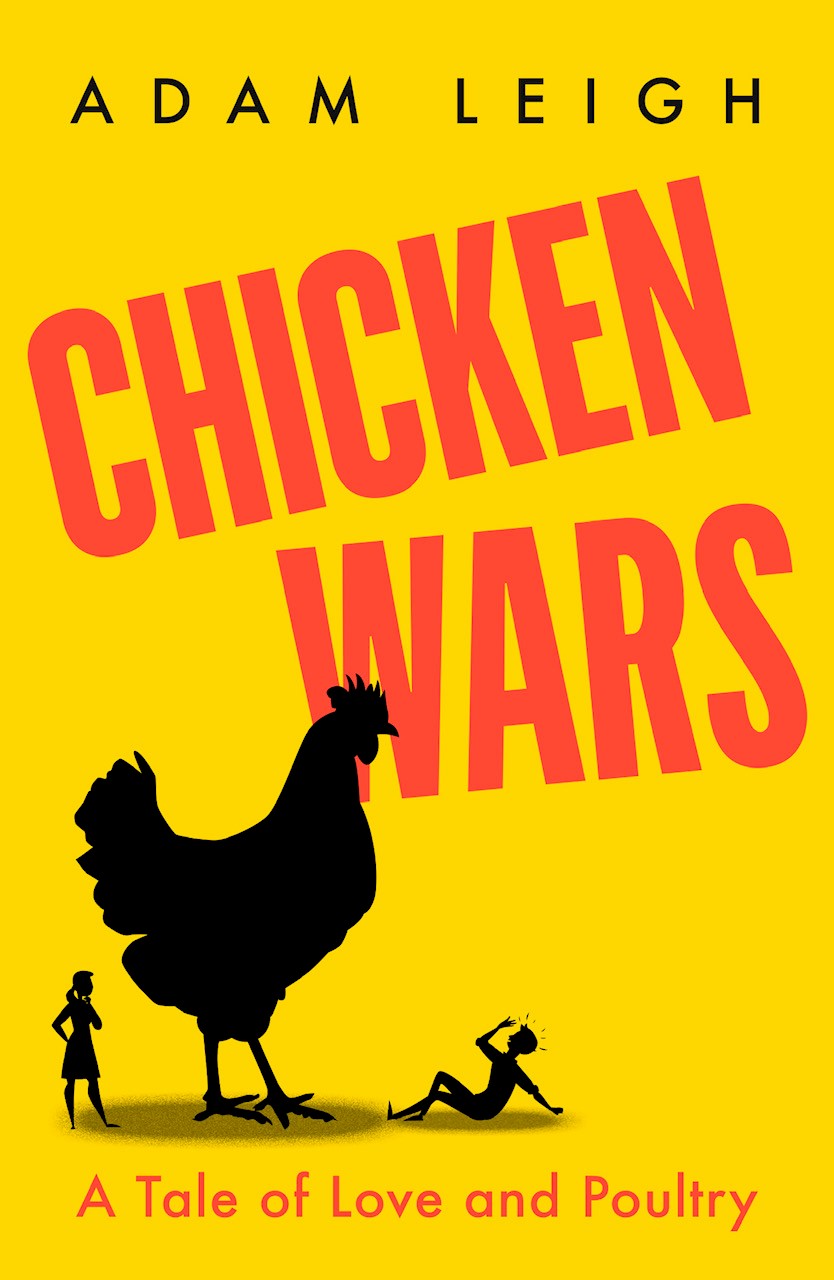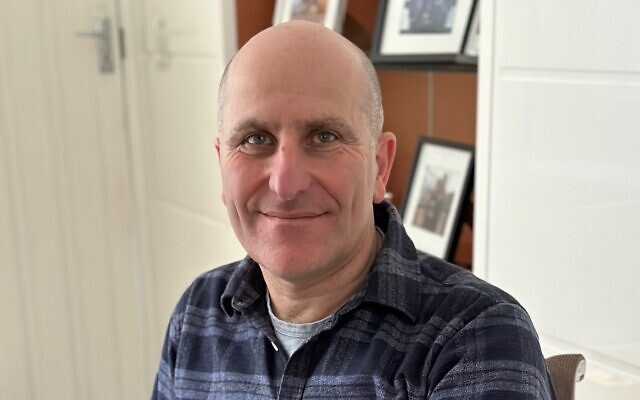Why did the author write the book? Adam Leigh on his latest novel, Chicken Wars
The talented writer's second novel,is a rollercoaster ride about the poultry-related life of a hapless hero.
Jenni Frazer is a freelance journalist
With a straight face, Adam Leigh tells me that his latest novel “is about more than kosher chickens”. In the next breath, however, he admits that “I wanted kosher chickens for comedy value”, because he believes chickens — before they have emitted a cluck — to be funny.
Chicken Wars, Leigh’s second novel, is a rollercoaster ride about the life and loves of his hapless hero, Jack Fogel. Jack is blessed — or should that be cursed? — with a grumbling East End grandpa, a set of utterly mismatched parents, and a brace of sisters whose entire childhood and adolescence seems focused on teasing him beyond reason.
This whole shaky edifice stands on the chicken empire known as Fogel’s Kosher Chickens, to which Jack becomes the unlikely and unwilling heir when he’s just starting out on his real passion, working in TV.
And he’s doing okay in TV, working on good programmes, writing and producing, while his irascible grandfather Solly hands over the reins of Fogel’s to Jack’s father, Phil. Jack, by this time, is married to a wife, Ali, whom he adores, and has two little daughters on whom he dotes.
But everything falls apart after Phil suffers a fatal heart attack “after arguing aggressively with a particularly obstructive representative of the London Council of Kosher Supervision.”
At 26, Jack’s life is effectively over. He is forced to take over the chicken business; his wife, writes Adam, “gradually fell out of love with him… his marriage deflated like a sad party balloon”. It doesn’t seem to matter that, weirdly, Jack has become a rather successful businessman, doing really well as the CEO of Fogel’s Kosher Chickens. Ali is clearly the sort of Yummy Mummy better suited to boasting about “my husband in TV” than about her husband striding about in white coats and wellies through his supervised abattoir — though, in fact, Jack isn’t actually doing the chicken-killing himself.
So far, so miserable. And then comes the Great Lie, which Adam Leigh’s hero cannot avoid uttering. He meets, on a blind date, a lovely woman, who owns and runs a vegan cafe. And for the life of him, Jack cannot “fess up” to Sonia what he really does for a living. Instead, he lets her believe he works in television. Disaster beckons.
 Sitting in his Finchley home, Leigh insists that “Chicken Wars” is not really a Jewish book. “It has a Jewish setting, but I think it has a universality about it which should appeal to non-Jewish readers, too. It’s about relationships, about duty, facing up to responsibilities, identity…”
Sitting in his Finchley home, Leigh insists that “Chicken Wars” is not really a Jewish book. “It has a Jewish setting, but I think it has a universality about it which should appeal to non-Jewish readers, too. It’s about relationships, about duty, facing up to responsibilities, identity…”
In his first novel, The Curious Rise of Alex Lazarus, Leigh, a former advertising man who now runs a successful executive search agency with his wife, Hannah, drew on his real-life friendship with Maurice Helfgott, currently the chair of World Jewish Relief, for a business-based comedy.
This time he has again plundered friendship, with the Grossman family, particularly brothers Antony and Stephen. They are the grandsons of the founder of Lewco-Pak chickens, Issy Grossman, on whom Leigh has based his fictional grandpa Solly Fogel. The brothers’ career paths diverged — Antony became a corporate lawyer who chairs Jewish Book Week, while Stephen took charge of the kosher chicken business. All three are passionate supporters of Spurs and the Grossmans, en route to matches with Leigh, would frequently reduce him to tears with anecdotes about the chicken biz. For this book, Stephen took Leigh round his wholesale factory and explained how things work, not least the sheer volume of chickens processed on a daily basis.
Leigh admits he expected the chickens to be noisier; in fact, he found “an odd sort of passivity” as they troop to their fate.
Leigh may not believe that this is a Jewish book, but he has given his hero Jack a best friend who is a rabbi, not a million miles away in personality from the late Rabbi Jonathan Sacks. Rabbi Isaac, with whom Jack went to school, has — like his real-life model — a foot in both camps, the internal Jewish world and the wider community, and is well-placed to give Jack advice on how — or indeed whether — to tell Sonia the truth. Leigh says: “I loved this part in the Talmud about white lies, and do you tell a bride that she’s not attractive?” Inevitably Shammai and Hillel differ on this, “one saying that you must always tell the truth, the other [trying to preserve peace] saying that you should not upset someone on their big day”.
In the novel, Leigh has given Jack two difficult teenagers, one of whom is more recalcitrant than the other. In real life, Leigh and his wife Hannah have three children, now aged 25, 23 and 18, and he assures me that the fictional Fogels are not drawn from his own offspring.
Far worse than the teenagers, he says, is Jack’s “horrible” mother, Stephanie, who abuses her son’s good nature at every turn. Again, a fictional portrait.
Leigh, a former co-chair of Highgate Synagogue and trustee of World Jewish Relief, has been married to his wife Hannah for 32 years. Ironically for this novel, Hannah went on the Shnat programme with Habonim, aged 18, and turned vegetarian. Though Leigh says “she is the most amazing meat cook”, their three kids are, in turn, a vegan, a vegetarian, and a meat-eater.
Oh, and they do have chicken on Friday nights.
Chicken Wars, A Tale of Love and Poultry by Adam Leigh, is published by Whitefox Publishing at £4.99 on 18 May 2023

Thank you for helping to make Jewish News the leading source of news and opinion for the UK Jewish community. Today we're asking for your invaluable help to continue putting our community first in everything we do.
For as little as £5 a month you can help sustain the vital work we do in celebrating and standing up for Jewish life in Britain.
Jewish News holds our community together and keeps us connected. Like a synagogue, it’s where people turn to feel part of something bigger. It also proudly shows the rest of Britain the vibrancy and rich culture of modern Jewish life.
You can make a quick and easy one-off or monthly contribution of £5, £10, £20 or any other sum you’re comfortable with.
100% of your donation will help us continue celebrating our community, in all its dynamic diversity...
Engaging
Being a community platform means so much more than producing a newspaper and website. One of our proudest roles is media partnering with our invaluable charities to amplify the outstanding work they do to help us all.
Celebrating
There’s no shortage of oys in the world but Jewish News takes every opportunity to celebrate the joys too, through projects like Night of Heroes, 40 Under 40 and other compelling countdowns that make the community kvell with pride.
Pioneering
In the first collaboration between media outlets from different faiths, Jewish News worked with British Muslim TV and Church Times to produce a list of young activists leading the way on interfaith understanding.
Campaigning
Royal Mail issued a stamp honouring Holocaust hero Sir Nicholas Winton after a Jewish News campaign attracted more than 100,000 backers. Jewish Newsalso produces special editions of the paper highlighting pressing issues including mental health and Holocaust remembrance.
Easy access
In an age when news is readily accessible, Jewish News provides high-quality content free online and offline, removing any financial barriers to connecting people.
Voice of our community to wider society
The Jewish News team regularly appears on TV, radio and on the pages of the national press to comment on stories about the Jewish community. Easy access to the paper on the streets of London also means Jewish News provides an invaluable window into the community for the country at large.
We hope you agree all this is worth preserving.






















